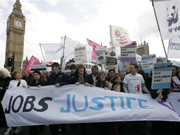Decent Work Decent Life Campaign Statement for G20 Meeting in London

On 2 April 2009, world leaders from the G20 countries will meet in London to find solutions to the global crisis. In the meantime, millions of people in developing and developed countries are already paying a high price for the crisis: global unemployment is expected to increase by at least 50 million and the global economic crisis stands to lead to cuts in the wages of millions of workers worldwide with a rise in the number of working poor living on less than USD2 per day (ILO).
The crisis must provide the trigger for a wholesale reform of the global economic order. As such it could be a turning point for the goal of achieving sustainable development and social justice. The central objectives of a new economic architecture should be shared prosperity with decent jobs and income for all. Indeed, the period prior to the financial crisis was characterised by a certain amount of GDP growth, but that failed to generate decent jobs and to extend benefits to working people and the poor. A new global economic order must promote fair distribution of wealth created and resources generated in the economy, based upon the centrality of decent work as a mechanism for employment generation, social protection, social dialogue and rights at work.
To move in this direction, we believe the following steps are necessary:
1. Decent Jobs and Quality Public Services
In order to mitigate the immediate impacts of the global economic crisis, especially on poor and economically vulnerable people, funding is urgently needed for the creation of decent jobs and adequate social protection packages. Governments should invest in and strengthen public provision of quality public services, which would also help to provide a vitally needed economic boost to stimulate higher growth in general. The international political and financial system needs to be restructured so that all countries have the space and resources they need to invest in public services and sustainable development.
2. Financial Market Regulation
Among many measures needed, two major issues require extraordinary measures and immediate action. First, tax havens and banking secrecy must be regulated. Developing countries lose an estimated €350 billion a year in illicit capital flight, two-thirds of which includes mispricing, transfer pricing and tax evasion practiced by many multinational enterprises. Governments must agree to plug these tax leaks and address banking secrecy jurisdictions (tax havens), in which a number of developed countries play a major part, in order for that money to be available for the achievement of decent work objectives. Second, reform of the financial markets must focus on the regulation of all financial players with common standards of transparency and disclosure, rigorous capital requirements, limits on excessive borrowing and bad loans, fair top executive pay and bonuses and avoidance of conflict of interest. Workers rights must be guaranteed with full access to information and consultation in the process of takeovers as well as regular and detailed feedback on pension funds and their investments. Effective monitoring and regulation of hedge funds and private equity by means of asset disclosure obligations and more stringent requirements on investor information is coherent with such measures and complements their objectives.
3. Social Justice
Aid: Industrialised country governments should not use the current financial crisis as an excuse to renege on their ODA commitments. Meeting the 1970 aid pledge of 0.7% of Gross National Product (GNP) is now more important than ever. Governments in the developed world should accelerate their increases in aid to meet their long-standing commitments, as well as ensure long-term, predictable aid flows to developing countries. Meeting these long-standing aid commitments will require only a tiny percentage of the huge sums used to bail out the banking system.
Trade: Developing countries should not be forced to open their markets and should be left the policy space to decide on the time and modalities of market opening. All multilateral, bilateral and regional trade agreements need to be subject to an assessment of their impacts on decent work and on developing countries.
4. Reform of Global Governance
Systemic reform of global financial institutions such as the World Bank and the International Monetary Fund. These institutions were at the forefront of advocating the types of policies that have resulted in destructive competition between national economies, including tax competition, privatisation, under-investment in public services and labour market deregulation – leading to much of the exploitation and decent work deficits that we see today. Any overhaul of the global financial architecture must include a complete reform of these institutions and their rules so that they put sustainable development and decent work at the heart of their policies and include developing countries on an equal basis in their governance processes.
5. Addressing Climate Change through Green and Decent Work To avert widespread climate disaster governments must launch a ‘Green New Deal’ through large-scale investment in green infrastructure that can provide decent work and prepare the ground for a far-reaching and ambitious international agreement on climate change at COP15 in Copenhagen, in December 2009.

